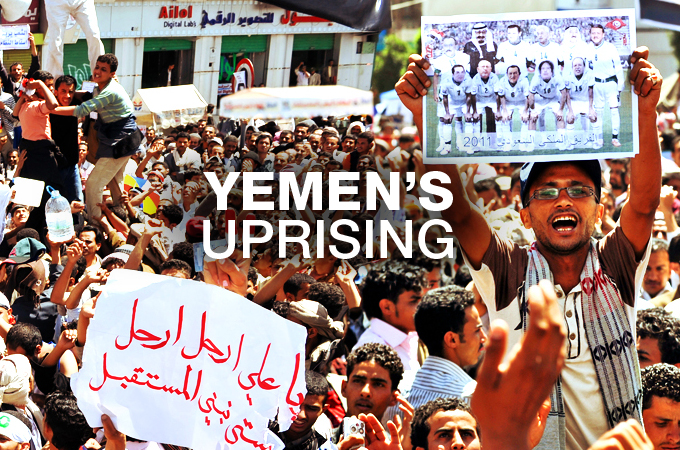Gulf deal ‘close’ on Yemen crisis
Details emerge of GCC-brokered settlement that could see Saleh step down as president in bid to end political turmoil.

Gulf Arab states appear set to unveil details of an arrangement to end Yemen’s political crisis that could result in Ali Abdullah Saleh stepping down as the country’s president.
Sources told Al Jazeera on Wednesday that the deal – brokered by the six-member Gulf Co-operation Council (GCC) – was close to being agreed on, and that an envoy was shortly to be sent to Yemen.
“We’re told that the UK and the US are behind this deal,” Kristen Saloomey, Al Jazeera’s correspondent at the United Nations in New York, said.
“It’s not clear right now where the opposition and the president stand on this deal, but our sources here at [the UN] feel that they are very close to reaching a final agreement.”
Under the GCC proposal, Saleh would most likely hand power to Abed Mansour Hadi, his vice-president, and both Saleh and his family would have immunity from prosecution.
Saleh, who came to power in 1978, has faced protests since January calling for his departure that have cost more than 130 lives in the impoverised Arab country.
 |
| Click here for more of our special coverage |
Even as a deal appeared close, Saleh was reported as telling a group of supporters that he would remain steadfast and would not accept “conspiracies or coups”.
“Those who want power or to gain the seat of power should do it by heading to the ballot box. Change and departure will be through voting under the legal framework of the constitution,” he was quoted as saying by Yemen’s official state news agency.
The expected deal on Yemen comes a day after GCC foreign ministers met a Yemeni government delegation in the United Arab Emirates.
There were fears that little progress had been made at the meeting after a brief, vague statement was issued calling the meeting “constructive” and vowing to “exert more effort to preserve security, stability and the unity of the Yemeni state”, but offering few details.
Ahmed bin Dagher, the spokesman of the Yemeni delegation at the meeting, said that any solution should not violate the constitution.
“We adhere to the constitution which we cannot breach,” he said, indicating that Saleh could serve out his term until 2013, a position stated previously by the General People’s Congress, Yemen’s ruling party.
The GCC, which is made up of Bahrain, Kuwait, Oman, Qatar, Saudi Arabia and the UAE, has tried for weeks to mediate a solution to Yemen’s crisis.
Protesters killed
The latest developments come against a backdrop of continued confrontations continued between security forces and anti-Saleh protesters.
One protester was killed on Wednesday when an armed man on a motorbike opened fire at demonstrators during Muslim dawn prayers in the city’s Al-Nasr Square, witnesses said.
“One protester was killed and around eight others were wounded,” Arafat Makki, a member of the protest organising committee, said.
The AFP news agency said a policeman was shot dead and three others wounded by protesters in Aden, Yemen’s main southern port city.
Medics and witnesses in Sanaa said that eight people had been shot dead since Tuesday, including a passer-by and a policeman.
The UN Security Council also met on Tuesday to discuss Yemen, adding the crisis there to its agenda for the first time, but failed to come up with a joint statement on the situation.
A press statement drawn up by Germany and Lebanon, both temporary members of the 15-nation UN Security Council, was blocked by a minority of states, diplomats said.